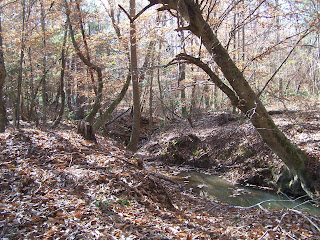It wasn’t that long ago that I first stumbled upon the term rewilding as something being applied to
human beings.
Maybe a year or so ago.
I had, prior to that, known the term as something being
applied to natural spaces … to natural landscapes … particularly large parcels
left to slowly return to themselves as they were before axes, saws, and other
forms of manmade machinery cut and raked them clean of their pristine natural
conditions. These reclaimed parcels will definitely show their age over time
but their new age will never be able to win a contest against what they were in
their virgin age.
Only of late, as best I can tell, has the term rewilding been adopted to apply to
humans walking through the process of rediscovering and cultivating their
better natural selves. It is, in my
opinion, quite a movement. A small one but, nonetheless, an important one in
this modern domesticated age.
The objective of rewilding, as applied to humans, is to reverse the process of domestication and
return to a more wild or self-willed state of being.
 It is no coincidence, in my mind anyway, that this rewilding
people-movement views nature, natural spaces, and the complex interdependent
relationships inherent in the assorted layers of environment as elements crucial to the heart-health of the
rewilding matter.
It is no coincidence, in my mind anyway, that this rewilding
people-movement views nature, natural spaces, and the complex interdependent
relationships inherent in the assorted layers of environment as elements crucial to the heart-health of the
rewilding matter.I have absolutely no problem embracing this philosophy. The philosophy does, in fact, echo tenets that I have believed and communicated for a long time and have always insisted that the tenets are more caught than taught.
I will, in the same breath, also say that some of the
characters on the stage of the rewilding play are a bit too much of the winter frozen precipitation variety for
my own day-in and day-out personal comfort zone. I’m quite sure some of the
rewilders would entertain something of an adverse opinion toward me if they
knew me. Each to their own though. I’m not turning up the thermostat or aiming
a heat-gun at any of them. I’m just saying. I’m simply keeping the keystroking
perspective here in this patch of woods real and honest.
Dirt clod, snowflake, or any state of being residing between
the extremes that mark the people-landscape.
I think what does matter is that there is a lot to discover
… and rediscover … every time our bipedal locomotion takes us into wild places
where wilderness is allowed to be wild. Not only regarding the natural
resources and natural entertainments that surround us. The discovery and
rediscovery reach far deeper … deep into the soil and bedrock of who we really are
as human beings.
There will always be a vast gulf of difference between
extrinsic and intrinsic motivation … between doing for whatever external reason or cause and being because we simply are.
Not to sound all mystical or metaphysical but we really are
connected to the natural environment whether we realize it or not. Without it there is no us. It can healthily exist without us … and would be better off without
humans constantly messing it up. The opposite is not true. We cannot live
without it.
Rewilding is primarily a personal attitudinal and lifestyle adventure.
Reversing the process and progress of domestication is a lot
easier said than done, whether it’s called rewilding or labeled with any other
name we can think of. I am of the opinion that those of us living outside of
Third World conditions have, this far along in the major time-scheme of things,
become overly domesticated. We have become overly dependent upon the supply train and conditioned to listen
to the hawkers of wares.
John Muir was spot-on when he wrote,
“Everybody needs beauty as well as bread, places to play in and pray in, where Nature may heal and cheer and give strength to body and soul alike.”
“Everybody needs beauty as well as bread, places to play in and pray in, where Nature may heal and cheer and give strength to body and soul alike.”
I seriously doubt that any of us modernites will ever be
able to totally escape the process and progress of domestication.
I don’t want to totally escape it.
There are aspects of it that serve me quite well … like this
laptop that I’m keystroking on. Shirli and I have, however, taken a great many
steps to limit the effects of the process and progress. Aggressively downsizing
and living in this small cabin in the woods (336 square feet and that includes
the 48 square feet screened porch) is one of them.
Getting here to this point … a point that allows us to invest
ourselves in being (and return to a more wild or self-willed state
of being) as opposed to spending the bulk of our time running around doing … was one of the best things we’ve
ever done.
You can read more about our small cabin adventure at


























